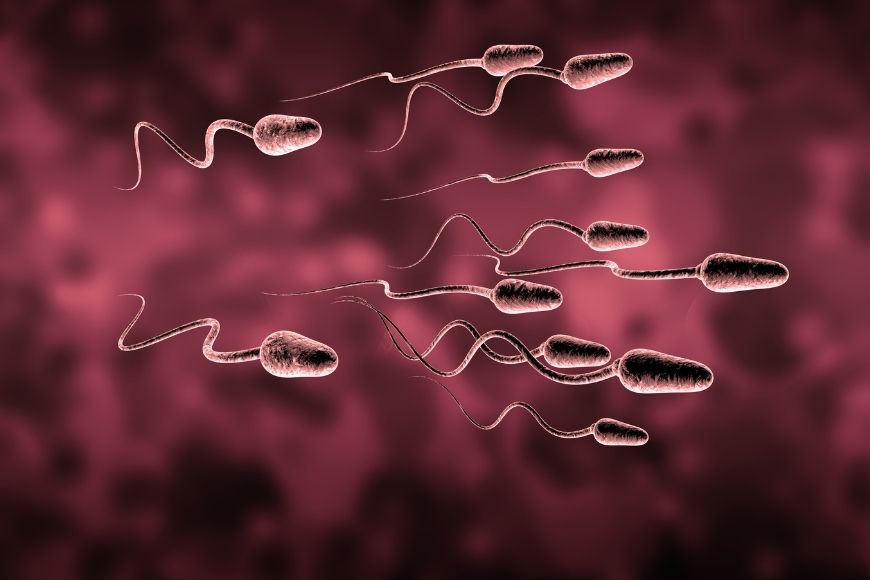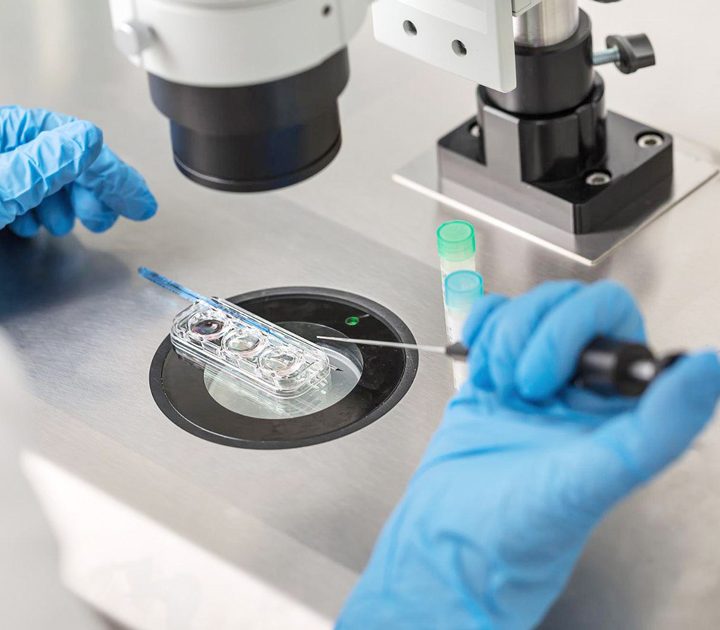
Semen testing is a basic, standard test during infertility diagnosis. It should be performed by every man trying to have a child.
Semen examination is a quick fertility test that gives a lot of information, on the basis of which you can expand the diagnosis or order appropriate treatment.
We perform the semen test in accordance with the latest WHO recommendations.
We recommend that you donate sperm on site at the clinic. The sample should be collected by masturbation into a sterile container. The use of lubricants should be avoided. The entire ejaculate should be collected in one specimen container, which is of great importance for the reliability of the obtained results. In the case of failure to collect all the semen into the container, postponing the examination to another date should be considered. After returning the container, it should be capped and properly labelled/signed, and then delivered to the laboratory.
You can also collect sperm outside the clinic and deliver the sample. In this case, however, you should remember to bring the sample in person. For the most reliable results, the container should be wrapped in aluminium foil after sperm collection and kept at a stable temperature close to body temperature. The specimen should be received in the lab within 30 minutes of collection, but not more than an hour after collection.
Semen analysis (spermiogram) involves a macroscopic and microscopic analysis of a semen sample. At the macroscopic level, we assess its volume, pH, colour, viscosity and overall appearance. At the microscopic level, we analyse sperm concentration and count in the entire ejaculate, mobility, viability, and morphological structure of sperm. It is also important to screen semen for other cells, such as white blood cells, epithelial cells or precursor cells. In some cases, semen analysis needs to be supplemented with other investigations, such as HBA, DNA fragmentation, semen biochemistry, microbiology or male hormone profile.
According to the WHO recommendations, testing should ideally be repeated 2 – 3 months after the initial test.
This results from the high variability of semen samples, because spermatogenesis, or sperm formation, is related to environmental factors. Stress, high fever, certain medications or supplements, or trauma to the genital area can affect the results. Semen parameters change even depending on the season.
We perform MSOME to assess the morphology of the motile sperm head at high magnification. The enormous magnification of over 6,000 times allows for a detailed assessment of the size, shape of the head and the presence of nuclear vacuoles. The presence of nuclear vacuoles is associated with possible damage to the sperm DNA, and therefore with reduced reproductive potential of the sperm.
MSOME classifies sperm into 4 grades:
Grade 1 – normal head and no vacuoles;
Grade 2– normal head and ≤ two small vacuoles;
Grade 3 – normal head and > two small vacuoles or 1 large vacuole;
Grade 4 – abnormal head and large vacuoles.
MSOME is helpful as an extension of diagnosis:
The test assesses the ability of sperm to bind to hyaluronic acid. HBA allows us to check the maturity of the sperm and its ability to fuse with the oocyte, which is essential for fertilization.
A test detecting the immunological cause of reduced fertility. We use MAR to check for the presence of antisperm antibodies in semen. The presence of antibodies reduces sperm motility and viability and makes it difficult for sperm to reach the egg. Antisperm antibodies may be present in semen even despite normal sperm analysis findings.
The test makes it possible to assess the integrity of the sperm genetic material. Regardless of normal semen analysis, the sperm may still contain damage within the genetic material contained in the sperm head. Fragmented sperm DNA can cause infertility, failure to develop an embryo or early pregnancy loss.
Flow cytometry is used to quantify DNA damage. It is a complex technique that analyses DNA strand breaks in detail. Thousands of sperm cells are assessed in a single test (flow cytometry allows for assessing more than 10,000 cells in one test), thus obtaining a reliable DNA analysis of the sample.
What is DNA fragmentation?
The function of the sperm is to carry the father’s DNA to the mother’s egg in order to give rise to an embryo. In this way, the embryo will contain half the DNA of each parent. If the DNA strand is damaged in any way, it can cause infertility, failure to develop an embryo or pregnancy loss.
In the case of minor chromatin damage, a normal oocyte is able to repair sperm DNA breaks after fertilization. However, the greater the number of DNA breaks and the more sperm affected by impaired chromatin integrity, the lower the chance of pregnancy. DNA fragmentation is also associated with poor embryo quality, implantation failure, and recurrent pregnancy loss.
Normally, DNA strand damage is associated with oxidative environmental factors. Other causes of DNA breaks include high temperatures, varicocele, smoking and genital tract infections. DNA fragmentation can also increase with age or as a result of taking certain medications and dietary supplements.
The level of sperm chromatin damage can be reduced by appropriate dietary supplements high in antioxidants. At Fertilita, we recommend taking them for at least 10 weeks before attempting to conceive or an IVF cycle.
There are also methods that allow screening sperm for chromatin integrity.
Semen culture for aerobic or anaerobic microbes is a standard microbiological test to determine whether the semen contains bacteria or fungi. An antibiogram is generated based on microbiological culture, which allows for implementing effective treatment.
In addition to semen culture, the doctor may order a urethral swab for intracellular pathogens, including Ureaplasma, Chlamydia and Mycoplasma.
As part of the diagnosis for genitourinary infections, (PCR-based) tests detecting the genetic material of pathogens such as: Haemophilus ducreyi, Cytomegalovirus, Lymphogranuloma venereum, Treponema pallidum, Varicella-zoster virus, Trichomonas vaginalis, Mycoplasma hominis, Ureaplasma urealyticum, Ureaplasma parvum, Chlamydia trachomatis, Mycoplasma genitalium, Neisseria gonorrhoeae, and HPV (Human Papilloma Virus) are also available.
The test measures the number of motile sperm cells that have a chance of reaching the egg. This test can be a supplement to sperm analysis, especially when preparing for insemination.
Biochemical Semen Analysis is performed only on the doctor’s request. Biochemical findings depend on a number of factors and therefore are not always of diagnostic importance. These test are not part of standard diagnosis of infertility.
Neutral alpha-glucosidase (NAG)
NAG is a test evaluating seminal vesicle and epididymal function. NAG level depends on sperm density, semen volume and pH. NAG levels can vary depending on the season.
Fructose
Fructose is a sugar that is the main source of energy for sperm. Evaluation of fructose levels may be helpful in assessing seminal vesicle function.
Citric acid
Measuring seminal citric acid may help assess prostate function. Its abnormal levels may affect sperm structure.
Zinc
Zinc plays a key role in the proper development of male reproductive cells. Low zinc levels are an important factor reducing semen quality and testosterone production in men.

leave your email or phone number we will call you back
Fertilita © 2022. Wszelkie prawa zastrzeżone.